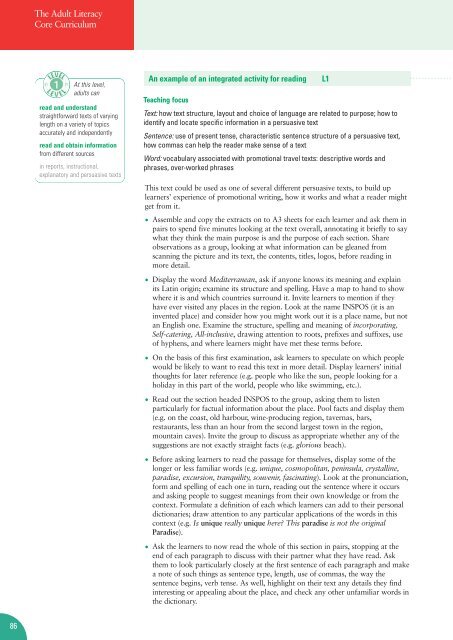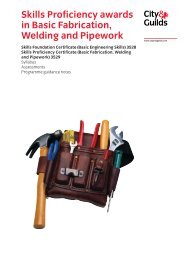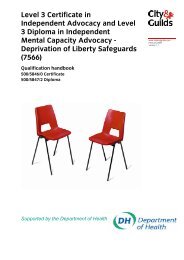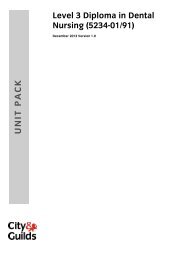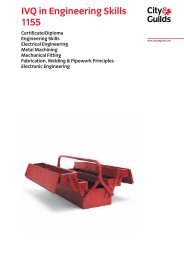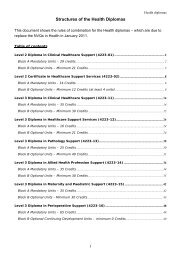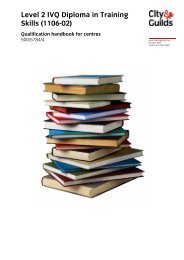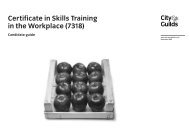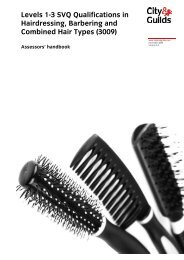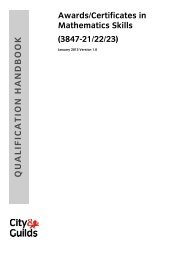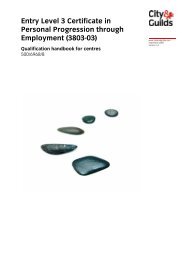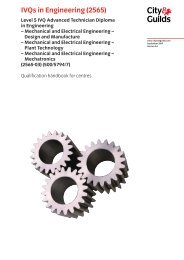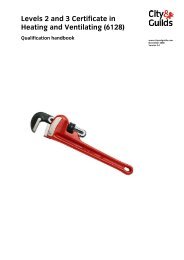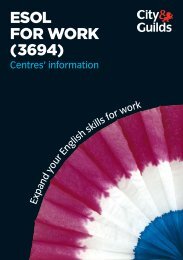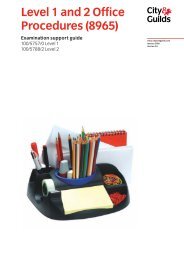Adult Literacy Core Curriculum - Nationally developed Skills for Life ...
Adult Literacy Core Curriculum - Nationally developed Skills for Life ...
Adult Literacy Core Curriculum - Nationally developed Skills for Life ...
Create successful ePaper yourself
Turn your PDF publications into a flip-book with our unique Google optimized e-Paper software.
86<br />
The <strong>Adult</strong> <strong>Literacy</strong><br />
<strong>Core</strong> <strong>Curriculum</strong><br />
At this level,<br />
adults can<br />
read and understand<br />
straight<strong>for</strong>ward texts of varying<br />
length on a variety of topics<br />
accurately and independently<br />
read and obtain in<strong>for</strong>mation<br />
from different sources<br />
in reports, instructional,<br />
explanatory and persuasive texts<br />
An example of an integrated activity <strong>for</strong> reading L1<br />
Teaching focus<br />
Text: how text structure, layout and choice of language are related to purpose; how to<br />
identify and locate specific in<strong>for</strong>mation in a persuasive text<br />
Sentence: use of present tense, characteristic sentence structure of a persuasive text,<br />
how commas can help the reader make sense of a text<br />
Word: vocabulary associated with promotional travel texts: descriptive words and<br />
phrases, over-worked phrases<br />
This text could be used as one of several different persuasive texts, to build up<br />
learners’ experience of promotional writing, how it works and what a reader might<br />
get from it.<br />
• Assemble and copy the extracts on to A3 sheets <strong>for</strong> each learner and ask them in<br />
pairs to spend five minutes looking at the text overall, annotating it briefly to say<br />
what they think the main purpose is and the purpose of each section. Share<br />
observations as a group, looking at what in<strong>for</strong>mation can be gleaned from<br />
scanning the picture and its text, the contents, titles, logos, be<strong>for</strong>e reading in<br />
more detail.<br />
• Display the word Mediterranean, ask if anyone knows its meaning and explain<br />
its Latin origin; examine its structure and spelling. Have a map to hand to show<br />
where it is and which countries surround it. Invite learners to mention if they<br />
have ever visited any places in the region. Look at the name INSPOS (it is an<br />
invented place) and consider how you might work out it is a place name, but not<br />
an English one. Examine the structure, spelling and meaning of incorporating,<br />
Self-catering, All-inclusive, drawing attention to roots, prefixes and suffixes, use<br />
of hyphens, and where learners might have met these terms be<strong>for</strong>e.<br />
• On the basis of this first examination, ask learners to speculate on which people<br />
would be likely to want to read this text in more detail. Display learners’ initial<br />
thoughts <strong>for</strong> later reference (e.g. people who like the sun, people looking <strong>for</strong> a<br />
holiday in this part of the world, people who like swimming, etc.).<br />
• Read out the section headed INSPOS to the group, asking them to listen<br />
particularly <strong>for</strong> factual in<strong>for</strong>mation about the place. Pool facts and display them<br />
(e.g. on the coast, old harbour, wine-producing region, tavernas, bars,<br />
restaurants, less than an hour from the second largest town in the region,<br />
mountain caves). Invite the group to discuss as appropriate whether any of the<br />
suggestions are not exactly straight facts (e.g. glorious beach).<br />
• Be<strong>for</strong>e asking learners to read the passage <strong>for</strong> themselves, display some of the<br />
longer or less familiar words (e.g. unique, cosmopolitan, peninsula, crystalline,<br />
paradise, excursion, tranquility, souvenir, fascinating). Look at the pronunciation,<br />
<strong>for</strong>m and spelling of each one in turn, reading out the sentence where it occurs<br />
and asking people to suggest meanings from their own knowledge or from the<br />
context. Formulate a definition of each which learners can add to their personal<br />
dictionaries; draw attention to any particular applications of the words in this<br />
context (e.g. Is unique really unique here? This paradise is not the original<br />
Paradise).<br />
• Ask the learners to now read the whole of this section in pairs, stopping at the<br />
end of each paragraph to discuss with their partner what they have read. Ask<br />
them to look particularly closely at the first sentence of each paragraph and make<br />
a note of such things as sentence type, length, use of commas, the way the<br />
sentence begins, verb tense. As well, highlight on their text any details they find<br />
interesting or appealing about the place, and check any other unfamiliar words in<br />
the dictionary.


